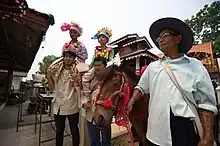Burmese in Thailand
Burmese in Thailand (Thai: ชาวพม่าในไทย, Burmese: ထိုင်းနိုင်ငံရှိမြန်မာများ) constitute Thailand's largest migrant population. According to the 2014 Myanmar Census, 1,418,472 former Burmese residents, including 812,798 men and 605,674 women, were living in Thailand, constituting about 70% of Burma's overseas population.[1] Burmese in Thailand tend to fall into three categories: professional migrants working in the business or professional sectors, laborers working in low-skilled professions, and refugees fleeing conflict.
 Ethnic Shans celebrating the Poi Sang Long Festival in Mae Hong Son | |
| Total population | |
|---|---|
| 1,418,472 (2014)[1] | |
| Regions with significant populations | |
| Languages | |
| Burmese, Mon, Shan, Northern Thai and various languages of Myanmar (native), Central Thai (lingua franca) | |
| Religion | |
| |
| Related ethnic groups | |
| Burmese diaspora, Bamar, Karen, Mon, Shan |
Migrant workers tend to hold low-skilled jobs in the fishing and seafood processing, construction, garment, and domestic service industries.[2] Macquarie University estimates that the average annual remittances from Thailand to Burma exceed US$300 million.[3][4] The movement of Burmese nationals into Thailand began in the 1970s, following the 1962 Burmese coup d'état and resulting economic decline from implementation of the Burmese Way to Socialism, and ongoing civil conflicts.[5] Burmese migrants contribute tremendously to the Thai economy, contributing between 5 and 6.2% of Thailand's GDP.[6]
Samut Sakhon province is home to Thailand's largest Burmese migrant community, representing about 200,000 Burmese migrants.[7][8] Other large Burmese communities reside in Mae Sot,[9] Ranong,[10]
In 2003, the Thai and Burmese governments signed a memorandum of understanding to formally recognize this labor migration flow and legalize migration through a government program to recruit workers directly from Burma, and to use a nationality verification process whereby migrant workers receive a temporary passport, an identity certificate, a visa to remain in Thailand for two years, and a change of work status to legal.[2]
There are also roughly 150,000 Burmese refugees living at 9 official camps on the Thai–Burmese border.[11] The largest such camp is Mae La refugee camp. In 2014, the Thai government announced plans to repatriate Burmese refugees who have been living in border camps for the past 2 decades.[12]
See also
References
- "The Union Report - Census Report Volume 2". The 2014 Myanmar Population and Housing Census. Department of Population, Ministry of Immigration and Population. May 2015. Retrieved 18 July 2015.
- McGann, Nora (20 February 2013). "The Opening of Burmese Borders: Impacts on Migration". Migration Policy Institute. Retrieved 18 July 2015.
- "MYANMAR: Remittances support survival". IRIN. 31 December 2010. Retrieved 18 July 2015.
- Turnell, Sean; Alison Vicary; Wylie Bradford. "Migrant Worker Remittances and Burma: An Economic Analysis of Survey Results" (PDF). BURMA ECONOMIC WATCH. Macquarie University. Archived from the original (PDF) on 15 May 2013. Retrieved 18 July 2015.
- Vicary, Alison (2004). "ECONOMIC SURVEY OF 'BURMESE' WORKING IN THAILAND1 : AN OVERVIEW OF A BEW PROJECT" (PDF). Macquarie University. Retrieved 18 July 2015.
- Brees, Inge (Winter–Spring 2010). "Burden or Boon: The Impact of Burmese Refugees on Thailand". The Whitehead Journal of Diplomacy and International Relations.
- SAW YAN NAING (3 March 2010). "Mahachai Migrants Eye Passports". The Irrawaddy. Archived from the original on 3 November 2011. Retrieved 18 July 2015.
- Saw Yan Naing (27 February 2010). "Burmese Official Urges Migrants in Mahachai to Register". The Irrawaddy. Retrieved 18 July 2015.
- "Mae Sot: Little Burma". The Irrawaddy. May 1999. Retrieved 18 July 2015.
- Moncrief, John S. (February 2001). "What's wrong in Ranong". The Irrawaddy. Retrieved 18 July 2015.
- "Burmese Refugees in Thailand". US Department of State. Retrieved 18 July 2015.
- SAWITTA LEFEVRE, AMY (14 July 2014). "Thai junta's pledge to send back Myanmar refugees sparks concern". Reuters. Archived from the original on 21 July 2015. Retrieved 18 July 2015.